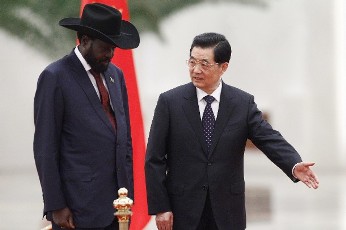China denies promising S. Sudan an $8bn development deal
March 15, 2013 (JUBA) – A senior diplomat has denied China ever promised South Sudan $8 billion in development funds after president Salva Kiir visited Beijing last April.

In an interview with Reuters on Thursday, China’s special envoy to Africa, Zhong Jianhua, who assisted with mediation efforts between the two countries, said there was never any deal.
However, Zhong conceded that South Sudan had potential and that China may be willing to play a future role in speeding up the country’s development, adding that any deal would be contingent on a lasting peace between Sudan and South Sudan.
“I don’t believe that this is something both sides acknowledged following the visit. This was not mentioned in any of the official Chinese reports following the visit; there was nothing about $8 billion,” he was quoted as saying by Reuters.
“It’s not impossible – maybe in the future, and maybe not only $8 billion,” Zhong added, without elaborating further.
The new nation faces enormous challenges ahead in terms of providing adequate infrastructure, including running water, electricity, road lights and bridges.
As a major supporter of Sudanese president Omar Hassan al-Bashir and South Sudan’s biggest oil customer – accounting for 82% of its oil exports, China has had to play a delicate balancing act during attempts to resolve ongoing conflicts with the country’s northern neighbour.
South Sudan, which depends on oil revenues for 98% of its annual budget, broke away from Sudan last July, with lack of agreement over how to divide the country’s vast oil wealth inevitably bringing the two countries to the brink of war once more last April.
The bitter dispute saw landlocked South Sudan shut down its 350,000 barrel-per-day crude output over a year ago following a disagreement with Sudan over how much it should pay to pipe oil through Sudanese territory.
In what is being hailed as a significant breakthrough, both countries this week finalised a deal to resolve long-running border and security disputes. South Sudan said it could be ready to restart oil production within three weeks and ordered oil companies and pipeline operators to begin prepare to resume production on Thursday.
Under the terms of the implementation matrix distributed by the African Union High Level Implementation Panel (AUHIP), the governments of the two Sudans are to instruct oil companies within 14 days to re-establish production, processing and transportation.
Zhong told Reuters that although the agreement was a positive step, he remained concerned about the peace process.
“These antagonistic feelings still exist. There are still people who think now is not the time for reconciliation … But the general trend is still progressing in a positive way,” he said.
“[Former] president Hu [Jintao] told president Kiir very clearly when he visited that if you want to develop, it will be very hard without peace,” Zhong added, saying his country was committed to working with the international community to mediate between the two sides.
While Western countries have turned their back on Sudan since the current government Khartoum came to power in 1989, due human rights abuses and links to terrorist organisations, China has ramped up its presence in the troubled region offering technical expertise and investment unencumbered by political conditions.
As civil war raged in Sudan’s western Darfur region the rest of the world stayed away from Sudan’s oil industry with US introducing sanctions. State-owned China National Petroleum Corporation (CNPC) led the development of Sudan’s oil industry during the 1990s.
It has since become the biggest investor in Sudan, importing some 70 percent of Sudan’s total oil exports in 2010. China is now Africa’s largest trading partner, having overtaken the United States in 2009.
With most of its oil investments now located primarily in South Sudan, China has a vested interest in the new nation.
Oil is the main source of state income for food imports and foreign currency in both Sudans, with the loss of oil exports sending the countries’ economies in to turmoil.
(ST)

